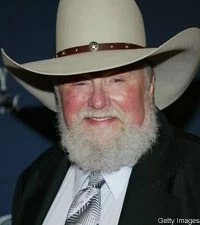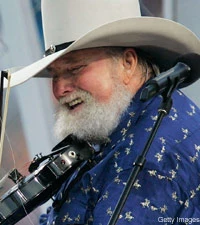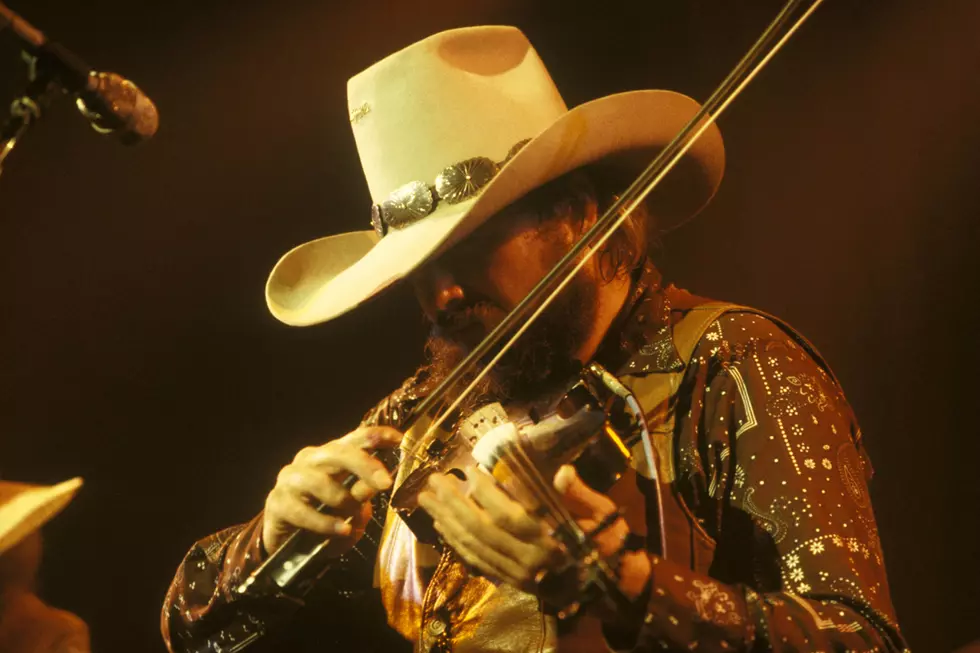
Charlie Daniels Celebrates 50 Years of Music and Memories
 Charlie Daniels is celebrating a milestone few entertainers reach -- his 50th anniversary in music. From his humble beginnings in North Carolina to worldwide fame, the music icon has enjoyed a career that has earned him hits on the rock, country and Christian charts and has collected him an impressive list of accolades. He has appeared in movies, authored books and released 50 albums.
Charlie Daniels is celebrating a milestone few entertainers reach -- his 50th anniversary in music. From his humble beginnings in North Carolina to worldwide fame, the music icon has enjoyed a career that has earned him hits on the rock, country and Christian charts and has collected him an impressive list of accolades. He has appeared in movies, authored books and released 50 albums.
The Boot sat down with the 71-year-old Daniels to talk about his new album, 'Deuces,' which features collaborations with Gretchen Wilson, Vince Gill, Brenda Lee, Brad Paisley, Dolly Parton and Darius Rucker, among others. We also chat with the famed fiddler about everything from rap to religion.
What keeps you still making music after all these years?
I love what I do. People say, 'Why don't you retire?' For what? You're supposed to retire to do something you want to do, and I'm doing what I want to do . . . I love being able to get up in the morning and think, 'I'm going to do something today that I thoroughly enjoy.'
 What did your parents think of your decision to be a musician?
What did your parents think of your decision to be a musician?
My dad wanted me to go to college and get a degree in forestry, because he was a timber man. But I didn't carry that gene or whatever it is to have the same love for it that he had. I can see my parents being very frustrated when I first started trying to play music, because music was thought of very much as a hobby. There were horror stories about people trying to make a living playing music and how their families would suffer. They'd go off and not show up for a while. That's the reputation that people playing music for a living had. It was looked on as something you did on weekends.
Your breakout hit, 'Uneasy Rider,' could easily have been pegged as a novelty song, possibly tainting your career. How did you overcome that?
It's hard to be taken seriously once you get pushed into that. There are a lot of people that are perfectly capable of doing other kinds of music, but they kind of get pushed into that category because of one song. I just refused to be pushed into that category. I did other records and did what needed to be done to overcome it. You've just got to stay with it until the world realizes, 'Hey, they are serious. They are capable of doing more than that.'
Some people, including Wyclef Jean, credit the 'The Devil Went Down to Georgia' with being one of the pioneering rap songs. Do you think of it that way?
That goes way back to an old form of music called "Talking Blues" that had been around forever. Instead of singing the lyrics, people talk them. I've been hearing it all my life. There was a guy, Robert Lunn, on the Grand Ole Opry that used to do that. He would be using some comedy sort of thing, something he'd sing, and there was a little punch line involved. It's an old form of music.
Having done this for 50 years, what are the biggest changes that you've seen in the music industry?
The technology -- it's gone nuts. The musical styles have changed a lot, which is good because music that stays static is not going to work. It's got to change from time to time . . . In general, it's a more mercenary business than the way it was at one time. There's more of a business attitude, and I think at one time there was a great love for the music itself.
Why did you decide to launch your own label, Blue Hat Records, in 1997?
We aren't in demand by the big labels. Rather than go around and give away the creative abilities, I'd rather have a little record company and just do what we do. There are very talented people in Nashville, but most of the people are involved in the music business from another point of view than I am. Everybody wants to sell records, but I want to play music too. I want to play what I write, and I don't want to sound like everybody else.
 What prompted you to release your 'Live from Iraq' CD last year?
What prompted you to release your 'Live from Iraq' CD last year?
I personally want people to understand that there's an awful lot going on in that part of the world and that you're not getting any of it off CNN. Our media is just literally ignoring the things that are happening. We wanted to say something, so we said something. I support the troops. The kids that are there are so wonderful and are so dedicated, and they know what they are doing. I can't think of any people that I have any higher regard for than I do for these young men and women in the service. They are the best we've got.
In recording your new duets album, 'Deuces,' how did you determine who would record each song?
It was a mutual consent -- a song that we both liked. Darius Rucker is a big Bob Dylan fan and ['Like a Rolling Stone'] was a good tune for us to do, and Vince [Gill] loved the one we did ['The Night They Drove Old Dixie Down']. Dolly [Parton] wanted to do something she wrote, which is a standard policy with her. She's constantly being asked to do something, but like she says, if she took everything that came down the pike, she'd be going all the time. So we did [her song] 'Daddy's Old Fiddle.' You just kind of go along and find something that works for everybody.
You and Brad Paisley recorded an instrumental, 'Jammin' for Stevie,' as a tribute to Stevie Ray Vaughn. Tell us about that session.
We walked into the studio and literally started jamming, and it just kind of evolved around to that little melody we came up with and went from there. You sit down with people and you are doing what you are doing, and you're playing and kind of feeding off each other. We jammed for a good little while, and I thought [we'd] better name it for Stevie. He was a nice guy. He was so talented. I think Stevie was recognized more after he died than when he was living. He took the blues to a whole other level. He will always be missed.
You and Marty Stuart recorded a song you co-wrote called 'God Save Us All From Religion.' What is the message of that song?
It's an easily misunderstood song, if you don't understand what we're talking about. Religion could be anything. Islam is a religion. It's not a peaceful religion. It's a war-like religion, always has been, always will be. Our Lord Savior Jesus Christ died for us to have salvation, not religion. Religion can be based on anything. Religion can be based on Satanism. Anything can be called religion. There's only one salvation, and that's through Jesus Christ. If this song gets any notice, there's going to be a lot of people saying, 'I thought you were a Christian?' Well I am. It's very important to me that nobody says, 'Well you guys are being sacrilegious.' No, we're not. We're just telling it like it is. That was the one song that I definitely wanted to do, and I'm so glad that Marty said he'd do it with me . . . I wanted to record it with somebody who understood what it meant.
What advice do you give to artists who would like to have the kind of career longevity you've enjoyed?
When you walk on stage or walk into a recording studio, when you do an interview or do anything with your professional life, you have to remember that this is the moment you are living right now. I've got to give it everything I've got. I've got to be able to keep my head in the game. I've got to do the very best I can in this moment . . . Never belittle a situation. Never walk by a fan. If they want autographs and you've got to catch a plane or something, smile and say, 'I'm so sorry, I do not have the time to stop.' Be nice to fans. Treat people the way you want to be treated.
What goals have you yet to accomplish?
I'm still trying to catch a 10 pound large mouth bass! . . . I have the same philosophy that I've had for many years. I want every show sold out and every album platinum. That is a hard goal to do, but it's something to work for all the time.
More From TheBoot





![Charlie Daniels’ Lavish $200,000 Tour Bus For Sale — See Inside [Pictures]](http://townsquare.media/site/204/files/2022/06/attachment-charlie-daniels-bus-for-sale.jpg?w=980&q=75)



